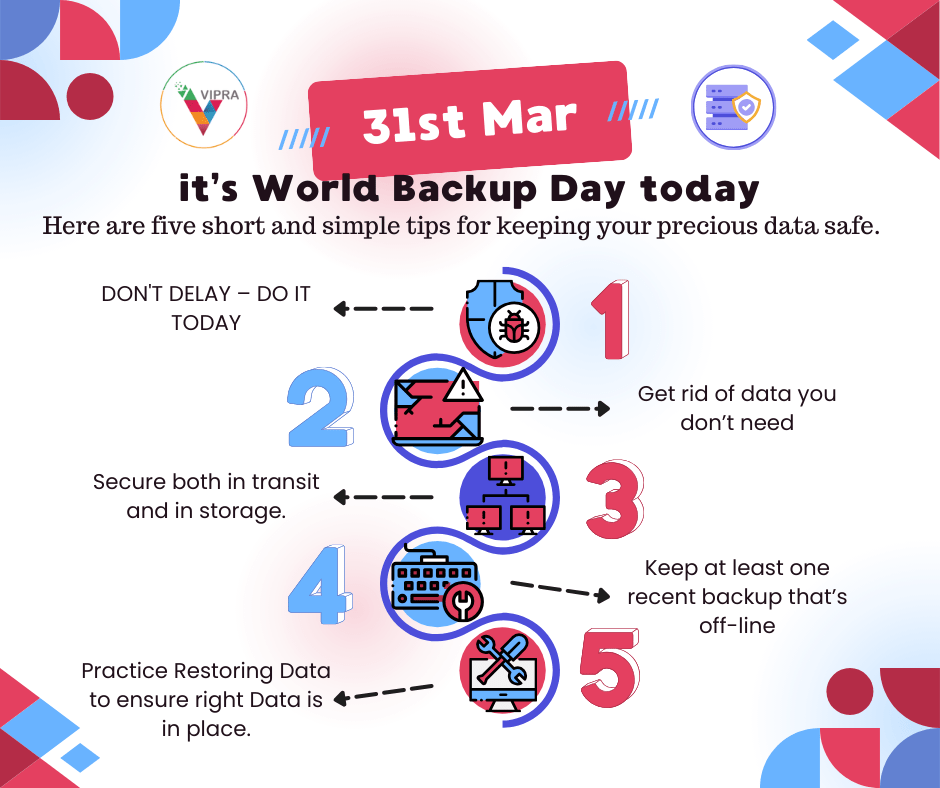Every year on March 31st, we celebrate World Backup Day – a crucial reminder that data loss is a real threat, and protecting your precious information is paramount. Whether you’re a tech-savvy startup or a local bakery with a website, having a robust backup plan is essential. Here’s why data backup matters, and how to ensure your business isn’t caught off guard by a data disaster:
Why Backup? The Data Disappearing Act
Data loss can happen in a blink due to various reasons:
- Hardware Failure: Hard drives, servers, and other storage devices can malfunction unexpectedly, taking your data with them.
- Cyberattacks: Malware, ransomware, and other cyber threats can encrypt or steal your data, leaving you scrambling to recover.
- Human Error: Accidental deletion, formatting, or software glitches can lead to irreversible data loss.
- Natural Disasters: Floods, fires, and other natural disasters can damage your physical infrastructure, destroying your data in the process.
Back Up Like a Boss: Strategies for Every Business
The good news? Data loss doesn’t have to be your business’s downfall. Here are different backup strategies depending on your business size:
Startups and Small Businesses:
- Cloud Backup: Cloud storage services like Google Drive, Dropbox, or Microsoft OneDrive offer affordable and convenient solutions for regularly backing up your data to remote servers.
- External Hard Drives: Invest in external hard drives for local backups. Regularly update these drives and store them off-site for added security.
- Automated Backups: Configure your computers and business software to automatically back up data to the cloud or external drives at regular intervals. This ensures you have a recent copy of your data in case of emergencies.
Large Corporations:
- Comprehensive Backup Systems: Implement robust backup systems with diverse options like local storage, cloud storage, and data tape backups. This ensures redundancy and minimizes the risk of losing all your data from a single point of failure.
- Disaster Recovery Plan: Develop and test a comprehensive disaster recovery plan that outlines how you’ll restore your data and operations in case of a major incident.
- Data Security Best Practices: Enforce data security best practices to minimize the risk of cyberattacks and data breaches. This includes employee training on data security protocols and strong encryption for sensitive information.
Website Owners and Managers:
- Website Backup Services: Utilize website-specific backup services that regularly back up your website files, databases, and content management system data.
- Database Backups: Regularly back up your website’s database, which holds essential information like user data, product listings, and orders.
- Offsite Storage: Don’t rely solely on cloud backups. Consider storing a copy of your website data on a physical, offsite server for added protection.
World Backup Day: A Call to Action
No matter your business size or technical expertise, data backup is a non-negotiable. This World Backup Day, take action!
- Assess Your Needs: Determine your data backup requirements based on your business size, data sensitivity, and budget.
- Choose a Backup Strategy: Select a backup strategy or a combination of strategies that best suits your needs.
- Implement Your Plan: Put your backup plan into action and schedule regular backups.
- Test Your Backups: Regularly test your backups to ensure you can successfully restore data in case of emergencies.
Data backup is an investment in your business’s future. Don’t wait for disaster to strike – take control of your data and ensure your business remains protected.
Bonus Tip: Spread awareness about the importance of data backup within your organization. Encourage employees to back up their personal data regularly and avoid storing sensitive business information on personal devices.
By incorporating these tips and taking action today, you can ensure your business weather any storm and keep your valuable data safe!


